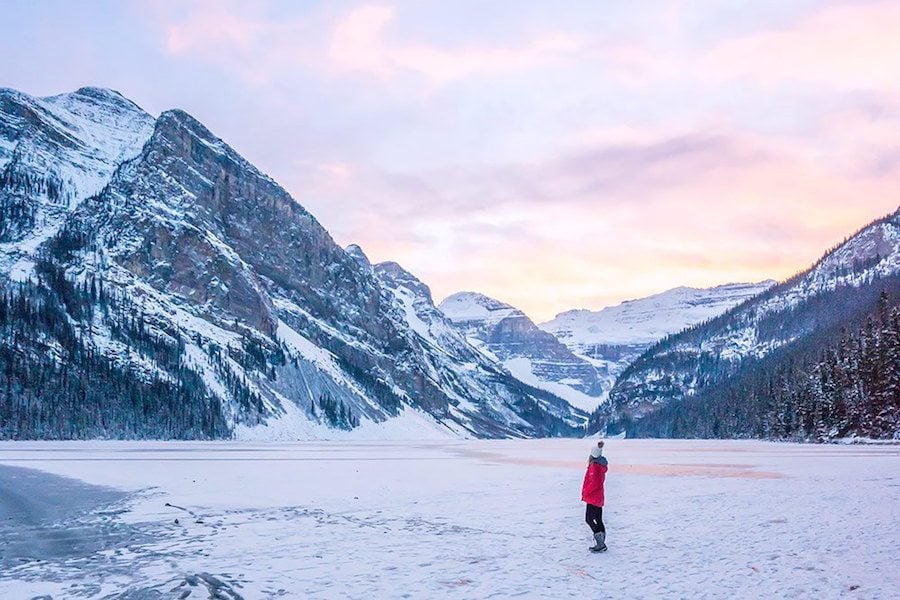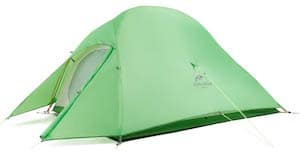Winter Camping Essentials & Cold Weather Camping Tips (2024)

This list of winter camping essentials includes the best winter tents and gear — plus need-to-know cold weather camping tips!
Winter is a great time to go camping. Not only is it a smart way to get coveted campsites, but you’re also pretty much guaranteed a quieter trip, prices tend to be lower, and most critters hide away in the colder months.
However, camping in the winter can also be an intimidating activity. In cooler temperatures, what gear you take, how you dress, and how you camp are all important things to consider in keeping you safe. Researching the right gear and how to plan ahead are essential steps for any cold-weather trip.
To keep you warm and having a great time in the outdoors, these are my top winter camping tips and essentials!

Table of Contents
Winter Camping Essentials & Cold Weather Camping Tips
Best Winter Camping Tents
The best tent for winter camping should be 4-season, designed to stand strong in any weather (including snow), and be made of a durable polyester or nylon. Something else to consider is getting a rain fly that extends out from the tent in order to better block out the elements, and a waterproof footprint for placing your tent on snow.
ALPS Mountaineering Tasmanian
The ALPS Mountaineering Tasmanian is a 4-season tent that features a full-coverage rainfly, extra-large zippers (great for opening with gloves on), and a stabilizing aluminum pole system. Due to this tent being a little larger, it does weigh a bit more at 9.8 lbs, but, unless you plan on backpacking, that’s not an issue.
Naturehike Cloud-Up
The Naturehike Cloud-Up is a 4-season tent that comes in 1, 2, and 3 person options. The tent is made with double anti-scratch polyester layers that are both strong and breathable and features a water-resistant rainfly. Not to mention, this tent packs down extra small and takes less than 5 minutes to set up.
Read more: Best Camping & Backpacking Tents (In-Depth Buying Guide)

Best Winter Camping Gear
Sleeping Gear: A quality sleeping bag is one of the top things you need for camping. In choosing the best sleeping bag, I recommend picking one with a cold-weather rating that’s a few degrees colder than your coldest expected temperature — this Coleman one is great. I also recommend bringing a dry bag to put your sleeping bag in during the day to keep it from getting wet.
Under your sleeping bag, you’re going to want a quality sleeping pad that has an R-value of 4 or more. Steer clear of any air-filled pads, and stick with foam. Additionally, I love to take a small, packable pillow that fits inside my sleeping bag at night.
Cooking Gear: As part of your kitchen setup, you’re going to want a couple of insulated water bottles (that can store both hot and cold liquids), a camping stove with fuel, a plate and utensil set, a pot set, a water filtration device, and plenty of easy-to-cook food.
Additionally, don’t forget a bear box or dry bag to hang your food at night (or just put it in your car trunk if you’re not backpacking).
Safety Gear: In keeping you safe out in the elements, be sure to bring along a headlamp and flashlight, a standard first aid kit, a whistle, a multi-tool, prescription medication, a compass, a map, sunscreen, duct tape, and a repair kit for your tent and stove.
I also like to bring along an external battery pack for my cell phone in case of an emergency — just remember to keep this in a warm place so the charge doesn’t die.
Accessories: On any camping trip, it’s smart to bring along hand sanitizer, fire-starting materials, toiletries, toilet paper, and a quick-drying towel.
Read more: The Ultimate Packing List for Campers (Must-Have Essentials!)

Best Camping Heater
A quality tent heater is absolutely essential when camping in the winter, due to you being especially at risk for hypothermia while you sleep. A quality camping heater will have auto shut-off features, an oxygen level sensor, and be relatively easy to carry.
Camping Emergency Butane Heater
This butane heater features a standard gas cartridge for ultimate portability, a ceramic burner, an auto-shutoff device, and it weighs just 5.4 pounds. However, it has a standard run time of just 2 hours per cartridge, so use it sparingly.
Mr. Heater F215100
This nifty portable propane heater is able to heat rooms up to 95 square feet! Plus, it is odor-free, has a maximum elevation of 7000 feet, and has a continuous run time of 5.6 hours.
Winter Clothing Essentials for Camping
In choosing clothing for camping, be sure to purchase items that meet the cold weather requirements for where you’re going, bring lots of layers, and make sure that all your base items are moisture-wicking.
Footwear: Warm moisture-wicking socks, sock liners, and a pair of insulated winter hiking boots are non-negotiable.
Base Layer: I always bring along a moisture-wicking long-sleeved top and fleece leggings as my base layer (For an extra layer of added warmth, I’m in love with these Woolx leggings.) Definitely double up on these, especially for multi-day hikes. Oh, and don’t forget moisture-wicking underwear!
Read more: The Best Cameras for Hiking and Backpacking

Mid-Layer: On top of my base layer, I always bring a fleece pullover or insulated vest.
Top Layer: In looking for a great winter hiking jacket, I always go for ones that are waterproof and windproof. Also, your snow pants should have the same parameters and have an internal lining to keep out snow.
Accessories: It’s smart to invest in a warm beanie and thick waterproof gloves for wintertime hiking. I also like to bring along a pair of small gloves or liners to wear under my large ones, hand and foot warmers for just in case, and a balaclava for when things get especially chilly.
Winter Hiking Essentials
If you plan on hiking while camping, or if you just need some tools to get to your campsite, then there are a few items to bring that will make your life supremely easier.
Foot Accessories: I recommend bringing a pair of gaiters to keep the snow out of your boots, and a set of crampons for traction when you need it. If you plan on hiking in deep snow, then a pair of snowshoes is a good idea as well.
Hiking Poles: I love these hiking poles from The Fit Life. They’re anti-shock, are comfortable to hold, extendable, and they come with additional snow-related accessories.
Backpack: In choosing a winter hiking backpack, you’re going to want one that’s lightweight, that has external loops, and that comes with compression straps. I like this pack from NEVO as it’s 40L with a 10L expansion option, is weatherproof, high quality, and features ergonomic shoulder straps and back support.
Read more: Ski Trip Packing List (Must-Have Essentials!)

Cold-Weather Camping Tips
Know Basic First-Aid
As with any hiking trip, knowing basic first-aid and how to keep your body in tip-top condition is extremely important. Specifically to winter camping, knowing how to prevent hypothermia and frostbite will be top of mind.
Use Synthetic Materials
This goes for any clothing you decide to wear and the sleeping bag you choose – you’re going to want items made with synthetic materials that retain heat and dry easily. Basically, avoid cotton clothing and skip the down sleeping bag.
Sleep With a Water Bottle
One of the simplest camping hacks is to boil water over your evening campfire and then pour hot water into a rubber water bottle. Then, place the bottle in your sleeping bag a little while before you go to sleep and when you do finally climb in it will already be nice and toasty.
Keep Your Batteries Alive
Cold weather is especially hard on batteries, and so when you’re camping it’s especially important to keep them charged. To do this, keep your gear inside your sleeping bag before you go to sleep for the night – your body heat will keep the batteries from losing charge.
Start a Fire
For those not aware of the best techniques and regulations, starting a fire can be difficult when backpacking. Sometimes the wood is damp, there are no safe places to light, or you don’t have enough kindling. However, starting a fire in the winter can be an even more daunting task if you’re not prepared.
For your best chances in lighting a winter fire, be sure to bring along some windproof matches and a lighter, get dry wood (wood that has some light, fluffy snow on top may still be dry enough to burn), and supplement with fire starter cubes or cotton balls soaked in petroleum jelly.
Read more: 20 Genius Camping Hacks Every Camper Should Know
Rock Your Tent
If the ground is too cold to stick your tent stakes into, then do the next best thing – keep it in place with rocks. If the ground is snowy and rocks are beneath it, then head to your nearest water source as you may be able to find some that you can dislodge on the beach.
Open Your Tent Vents
In order to keep your tent from filling with condensation from your breath and freezing, be sure to open the vents on your tent, even if it’s a cold night. You don’t want a frozen tent interior.
Camp Near Wind Protection
In choosing a spot to set up camp, try to set up near a group of trees if possible (but not underneath any unstable or damaged ones). This will protect you from the wind and help keep you warm.
Read More:
Havasu Falls Camping Guide: Everything You Need To Know
Romantic Camping Ideas For Couples
12 Budget-Friendly USA Winter Vacations (+ Cheap Things To Do)
8 Best Small Travel Trailers (Under 2,000 Pounds)
Camping Tips and Tricks for Beginners: Everything You Need to Know
Camping in Zion National Park: Everything You Need to Know
10 Best Free Campgrounds in Northern California
The Best Places to Camp in California (And Must-Know Travel Tips!)
As an Amazon Associate I earn from qualifying purchases. I’m also a member of other affiliate programs. For more info please read my Privacy Policy








